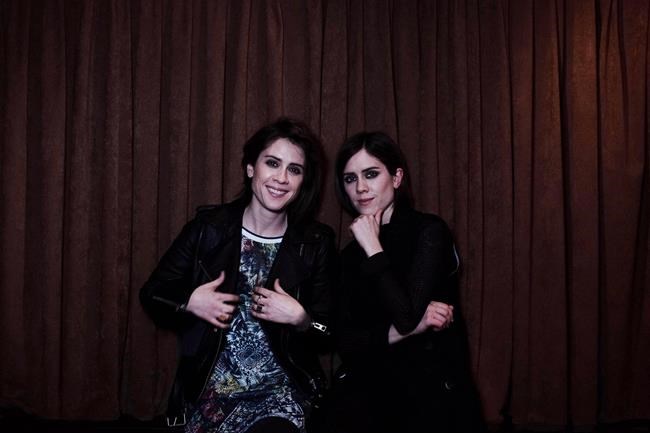Elevate your local knowledge
Sign up for the iNFOnews newsletter today!
[byline]

TORONTO – Tegan and Sara count themselves among the lucky few women in the LGBT community who have broken into mainstream pop music.
The twin sisters forged a successful indie music career for a decade before their Top 40 hit “Closer” rocketed them to new heights of fame.
And the Calgary-raised duo has been unstoppable ever since.
Their first true pop album “Heartthrob” rose to No. 3 on the Billboard 200 album chart in 2013 and they followed it up with the Oscar-nominated track “Everything is Awesome” from “The Lego Movie,” which they performed during the televised awards ceremony.
Tegan and Sara’s new album “Love You to Death” is a clear message they have no plans of leaving pop for now. They will perform Sunday at the iHeartRadio Much Music Video Awards, which airs on CTV and Much Music.
The musicians spoke to The Canadian Press about the complex gender dynamics portrayed in their latest single “Boyfriend,” a song about two lovers in a relationship where the boundaries haven’t been defined.
CP: Choosing “Boyfriend” as the album’s lead single was bold. It’s rare to hear lyrics about roles we play in relationships and the confusion that erupts when they’re not defined. And it’s particularly unique coming from women singing about playing the role of a boyfriend.
Sara: I very knowingly and deliberately used certain language and turns of phrase, like “the crying game” or like playing with this idea of, “You treat me like your best friend. You turn me on like your boyfriend.” I was sort of toying with that idea.
CP: On first listen, my thought was, “How will straight audiences react to this?” considering it’s a thinly veiled song about a same-sex relationship. Will it resonate with enough listeners to be a commercial song?
Sara: The thing I’ve struggled with most was this idea it wouldn’t somehow be relatable because people were too obsessed with the gender identity or sexuality of people in the narrative — especially men. I mean, men get really hung up on those types of things. Women generally have more of a flexibility and can accept those kinds of things a little bit more. It’s a litmus test for our society right now. Can all these different people relate to something that is very specific on record?
CP: Putting the song on your album is totally different — but you made a statement, in a sense, by making it the lead single.
Sara: I was a bit aggressive that I (thought) it should be. For me it’s an anxiety of like, “Let’s just get it out there. If it doesn’t work, and it pushes things too far, we can always roll with something else.” We can always roll with “U-turn” or “Stop Desire,” songs we think are equally as strong, but maybe don’t have as strong of a queer identity on first listen.
CP: You’ve been proud to identify as lesbians since your days on the local Calgary music scene. Working in the bigger industry can be different. You’re still prominent voices for a minority group. How do consider your role in pop?
Sara: There’s a lot of queer artists, (but) no women, which continues to sort of motivate us. Sometimes the mainstream can be exhausting. It’s a lot more work, a lot more touring and a lot more exposure. There’s this part of me that sometimes is like, “Oh God, should we just go back to the way we used to be? Do we want this?” Then I almost feel like we have a responsibility, at least for a while longer, to continue to fight to get women — and queer women specifically — onto pop radio.
CP: Is getting your unique voice out there easier now that you’ve found radio support?
Sara: It is an interesting time and things have changed. I don’t mean to imply that it wasn’t difficult. The last 17 years have had incredible highs and some pretty tough valleys in terms of misogyny, sexism and homophobia. An incredible revolution and evolution has happened and pop music has been a part of that. I think that’s why we feel so comfortable (in pop) because they were embracing queer culture in a way that indie rock wasn’t.
CP: All those years as indie rock performers and you didn’t feel accepted?
Sara: We didn’t feel like we belonged. We felt like we had a lot of people coming up to us at festivals and going like, “God you guys are really great” but they would never have been vocal (supporters). (So) we started to move towards dance music, we had big hits with Morgan Page and Tiesto. That was a lot of dudes and a lot of straight people.
CP: “Love You to Death” was fully produced by Greg Kurstin, who you worked with on “Heartthrob.” He also co-wrote Adele’s “Hello” and has an extensive resume of working with female popstars. What drew you back to him?
Tegan: He has worked in every kind of genre. He’s had decades of experience in a band. He’s literally done it all. Because of our back catalogue he handled us delicately.
Sara: (After “Heartthrob”) we spent four years touring. I remember thinking, “OK, I know what I wanna do again and what I don’t wanna do.” Being able to say, “I wanna work with Greg Kurstin, I want to write these types of songs,” allowed us to make something a little more streamlined and cohesive. I would never give up the experience of “Heartthrob” but it was a little all over the place. We were trying to figure it out as we went along. This is definitely a more deliberate effort.
— This interview has been edited and condensed.
Follow @dfriend on Twitter.
Want to share your thoughts, add context, or connect with others in your community?
You must be logged in to post a comment.